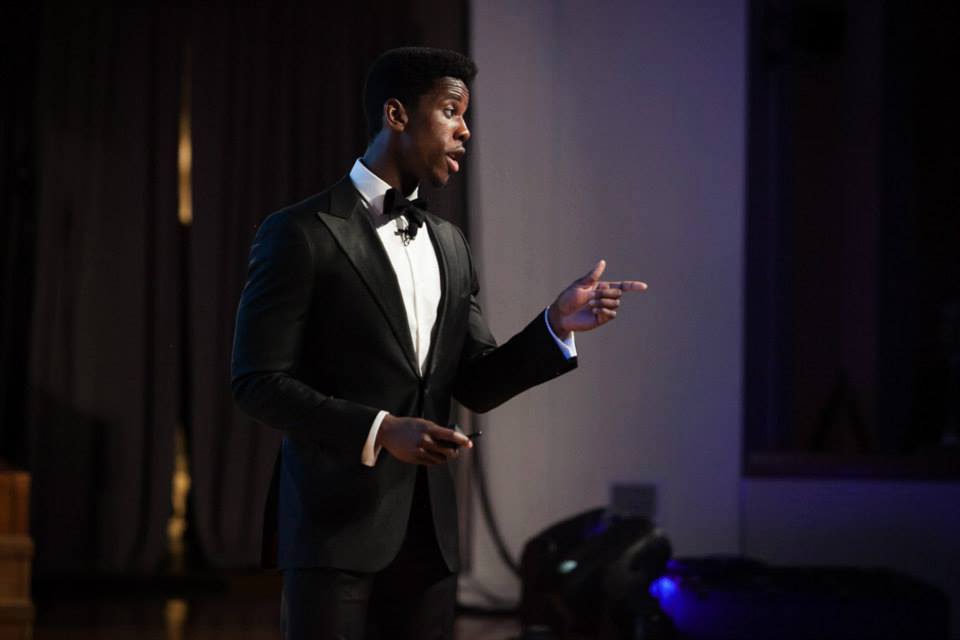Obidi Orakwusi is trying his best to convince me he needs $2,500 for his business as much as anyone.
The 2012 University of Maryland graduate is wriggling in front of a dozen people inside the Reginald F. Lewis Museum near Little Italy at the end of his portion of this modest business pitch competition. On the floor beside him are the certificates documenting two of the three patents he has on the Mega Bar, the first product he designed for his fledgling one-man fitness company Gym Supreme.
He had just done what he does so well: confidently describe his grasp of what it takes to launch a profitable fitness product in a glutted market without distribution partners or any money to speak of.
Now he’s fielding questions from the judges of this “Shark Tank-style” competition that served as the closer of the Innovator’s Small Business Summit, organized by City Councilman Nick Mosby’s office with consultancy I Am O’Kah! as part of Baltimore Innovation Week 2015.
Congrats to @GymSupreme for winning the Innovator's "Shark Tank" competition. His all-purpose gym is amazing! pic.twitter.com/294mRaU3kg
— Nick J. Mosby (@Nick_Mosby) September 26, 2015
The morning featured a pair of panels on access to capital and mentorship. Now the remaining attendees watched only two participants pitch their companies to a judge panel that included Mosby, a small business consultant, an entrepreneur and, full disclosure, this reporter.
Orakwusi seemed nervous he was about to lose.
It was a tricky situation: the two women against whom he was competing for the grand prize of $2,500 and other services were only just beginning plans for their personal assistant outsourcing effort. In comparison, Orakwusi seemed to heavily outmatch them.
Last fall, he raised more than $16,000 on his $12,000 Kickstarter goal. To do so, he said he sent more than 3,000 individual, personalized emails to personal trainers, gym owners and retailers. He designed, prototyped, manufactured and shipped more than 150 early units of the Mega Bar. This spring, he pitched his business to Kevin Plank at the Cupid’s Cup Competition.
By contrast, the competing pair was still developing what their demographic would be. Why would Orakwusi need the money more than they did?
So in the question portion of his time, the Owings Mills resident is explaining why he needed $2,500 — to help deflect some variable shipping costs that increase with his current low volume of sales, he said.
“A true entrepreneur learns to do everything,” he added. “Because in the beginning, you need to save costs wherever you can to make it work.”
And it does appear Orakwusi is trying to make it work. But the challenge is that to do what wants to do — to bring a fitness product to mass scale — he needs a lot more money than an apartment security deposit. Already he says he has relied heavily on the University of Maryland entrepreneurship community — that’s how he got his manufacturer, for example — but his organic marketing isn’t powerful enough to sell enough units to bring cost down far and fast enough to self-fund the effort.
In the end, Orakwusi won the cash prize.
He also met a representative of the Maryland Small Business Development Center at the event and plans to be out at others during Baltimore Innovation Week to find investors and other next steps, but he is likely at a critical moment. Nearly a year since his product first shipped, he’s still sold fewer than 200 units. He has the superhero-like physique and the personal trainer certification and the student founder-turned-struggling young entrepreneur story down. But now what?
He answered that in way with an off-hand comment he said outside of the museum, near his beat-up car: “Something big has to happen next.”
Before you go...
Please consider supporting Technical.ly to keep our independent journalism strong. Unlike most business-focused media outlets, we don’t have a paywall. Instead, we count on your personal and organizational support.
Join our growing Slack community
Join 5,000 tech professionals and entrepreneurs in our community Slack today!

Entrepreneurship is changing, and so is the economic development behind it

Tech Hubs’ new $210M funding leaves Baltimore and Philly off the table

Here’s what to know before using AI to craft your brand’s social media posts


